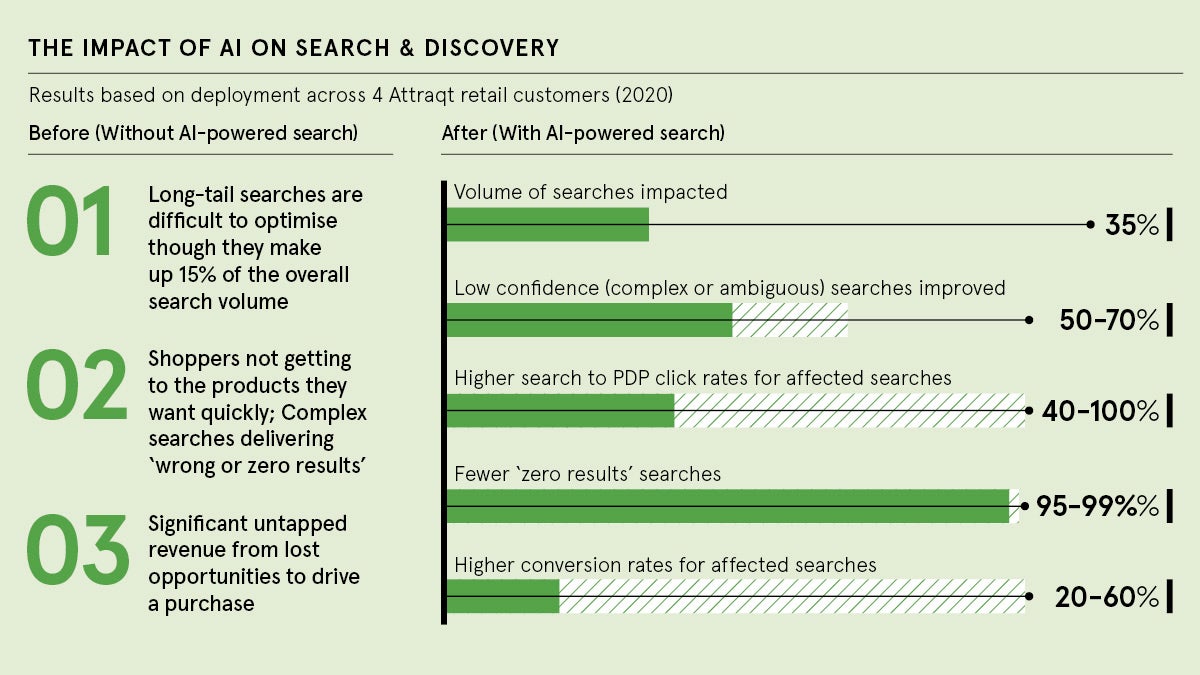SPONSORED BY Attraqt
The ability to search and find the product you want is the most critical factor of every shopping experience, especially with the shift to online in this coronavirus-conscious era. Google knows it, so does Amazon, that’s why they invested heavily in search powered by artificial intelligence (AI). Every keyword search counts. Search technology is now the most underrated function in retail.
“On-site search has been neglected until now. This is one area retailers can up their game with little investment, by accessing untapped revenue opportunities immediately. Return on investment is huge,” says Mark Adams, chief executive of Attraqt, a global leader in online search and merchandising solutions.
Retail ecommerce is increasingly about convenience at the point of purchase, however product discovery on a website can be challenging. Shoppers often need to type in the exact words to get to the products they want. Relevant search results are often low. With large retail catalogues, finding products quickly can be an issue, as can locating items on unfamiliar websites. This issue has been amplified during the pandemic as consumers shop more online.
“For most retailers, search still runs on legacy technology that’s not fit for purpose. Yet shoppers expect a ‘Google quality’ response. They want to enter increasingly complex text strings into search boxes and get a spot-on result instantly. But this isn’t happening. Search is not meeting rising consumer expectations,” says Adams.
AIM-listed Attraqt works with more than 300 brands globally, including adidas, The Kooples and Screwfix.
Such savvy retailers increasingly realise they need a best-of-breed approach using the latest ecommerce solutions to drive better conversion, growth, revenue and superior experiences. Search is just one tool out of dozens retailers can deploy, yet this function is the start of a high proportion of shopper journeys that end in a checkout. It is crucial.
“If you’re not returning relevant results on that first search term or worse ‘no results’, that’s often the end of the shopper journey. If you increase the number of products someone clicks on by even a small amount, you’re going to have more customers checking out,” says Adams.
On-site search has been neglected until now. This is one area retailers can up their game with little investment, by accessing untapped revenue opportunities immediately.
“AI-powered search can have a radical impact on conversion rates, sometimes by up to 60 per cent. We’ve achieved increases in revenues of between £3 million and £10 million in the deployments Attraqt has undertaken so far. This is game-changing.
“Search results using algorithms and machine-learning can sift through vast troves of data ranking them in milliseconds providing greater relevance. This impacts a retailer’s bottom line. Businesses need to deploy it right now if they aren’t doing so.”
Increasingly search is managed within the shopper journey. Merchandising teams know what products customers click on, browse and purchase after their searches. AI can interpret this data, learn and feedback for subsequent queries. This is called contextual search and gives the retailer more strategic control to deliver the right experiences over shopper journeys that start with keyword queries.

“Retailers are never going to be able to tag all their products effectively. This is where machine-learning helps. AI-powered search learns over time correlating both product tags and searches with customer data. This mapping is crucial. In turn it gives customers a personalised experience, providing relevance and context every time they search,” says Adams.
Algorithms can be trained on whole product catalogues and usage logs, crunching data on images, text, descriptions, categories and other attributes, creating a unique product fingerprint for each item. This relies on deep learning, natural language processing, computer vision and information retrieval technologies, resulting in much better search.
“Our 2020 acquisition of proprietary IP, from leading AI innovation lab Aleph One, allows us to do just that. Now any of our retail customers can deploy this technology,” says Adams. “It’s the next frontier.”
For more please go to www.attraqt.com
On-site search has been neglected until now. This is one area retailers can up their game with little investment, by accessing untapped revenue opportunities immediately.



